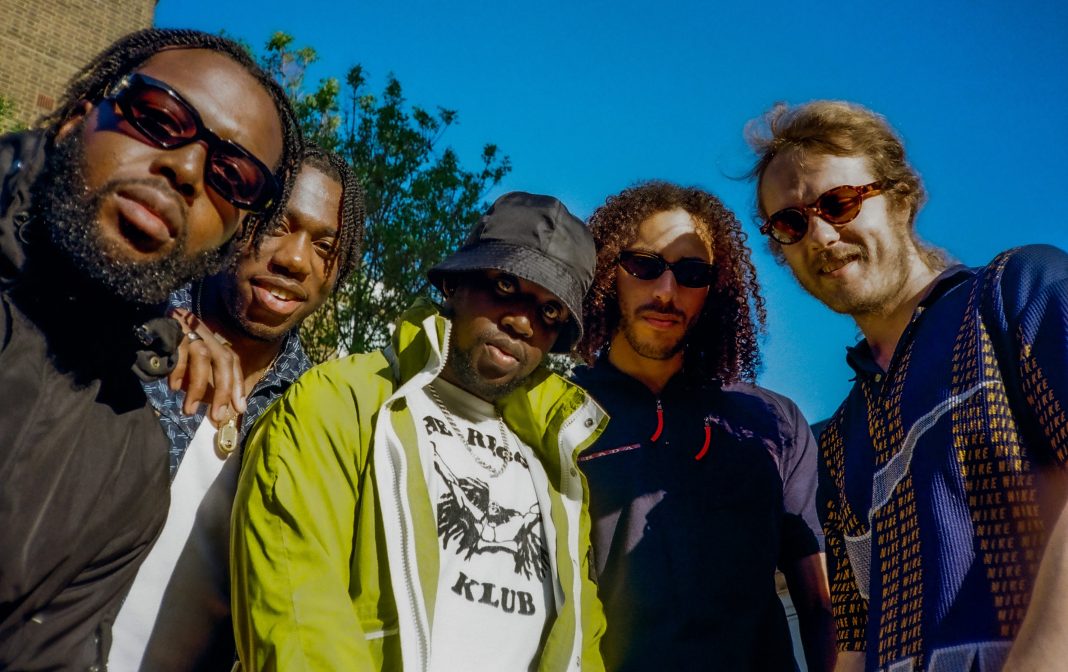When Ezra Collective were promoting their second album, ‘Where I’m Meant To Be’, they described it as “a venture in discovered maturity and raised stakes”, testament to the hope and creativity that allows us all to rise and meet the challenges of tough times. Recorded during lockdown, the studio gave the jazz group a much-needed anchor, a space where they could feel safe in the redeeming power of optimism.
“I had this feeling that I wasn’t necessarily where I wanted to be, but if I kept working at it, I would be soon,” said drummer and bandleader Femi Koleoso, speaking to the Evening Standard about the record’s title. “With our new album, we wanted to evoke that journey.” Tonight that journey reached its crescendo: beating the likes of Jockstrap, Raye, Arctic Monkeys, ShyGirl and Jessie Ware to the prize, Ezra Collective bagged themselves their first Mercury Prize win and with it, a cheque for £25,000.
Made up of drummer and bandleader Femi Koleoso, bassist TJ Koleoso (Femi’s brother), trumpeter Ife Ogunjobi, keyboardist Joe Armon-Jones and tenor saxophonist James Mollison, Ezra Collective seem typical for the Mercury Prize in some ways. Like nine of the previous ten winners, they are London-based, and their music attracts the kind of highbrow critical acclaim that you would normally expect from this prize, focused very much on artistic intrigue rather than the number of units shifted. But in many other ways, they are wildly different, and quite inspirational in the path that they are carving. Formed almost a decade ago, the group first met at Harrow-based educational scheme Tomorrow’s Warriors, designed to foster inclusive access to jazz for those who may otherwise struggle to gain a platform — namely Black musicians, women and those without certain forms of socio-economic privilege.
Encouraged to express themselves freely (and to draw on their natural genre-bending influencers as young Londoners), the group found success in 2019 with the single ‘Quest for Coin’, and quickly became the face of New London Jazz — a spirited, youthful new take on the genre that pushed it into interesting new (and often indie-DIY adjacent) realms. Alongside the likes of Moses Boyd, Nubya Garcia, Kamaal Williams, Theon Cross and even jazz-adjacent guitar groups like Black Country, New Road and Squid, London’s live music scene gained new vibrancy and experimentalism in the late 2010s, proving that more and more young people were engaging with instrumentalist traditions.
Judged as both a record of our times and on its own artistic merits, ‘Where I’m Meant To Be’ feels like a genre firing on full cylinders, and a testament to Ezra Collective as an era-defining act. Far from evoking lo-fi study vibes or chin-stroking elitism, Ezra Collective’s blend of diasporic influence — dancehall, grime, salsa, Amapiano — is a form of a jazz that feels accessible and down to earth, as likely to soundtrack a lively night out as it is a cool interlude in your favourite arthouse drama. Though their technical performance relies on the synergy of close-knit brotherhood, they also have a keen eye for external collaboration. Across the record, you hear features from Sampa The Great, Kojey Radical, Emile Sandé, Steve McQueen and Nao, as well as thoughtful homages to their elders — a snippet of Damien Marley’s ‘Welcome to Jamrock, and a talking clip of late Nigerian drummer Tony Allen, detailing his determination to play jazz “my way.”
The true beauty of the record is in how thoughtfully it all locks together; rather than insisting on being one thing, it serves to remind the listener that jazz is a fluid, free-moving and often joyful thing, designed to evoke feeling even when there aren’t any words. On the Mercury stage, anyone not acquainted with their talents quickly understood what they were in for— for the awards night, they chose to perform the somewhat prophetically-titled ‘Victory Dance’, turning a sometimes stuffy room into something akin to a Caribbean wedding. For an award launched to “recognise artistic achievement across a range of contemporary music genres”, you’d be hard-pressed to find a group that embraces the challenge of uniqueness, nailing several styles at once.
More than the record itself, or even the importance of jazz, the triumph of Ezra Collective allowed them to lay forth another more important message. With good friend, collaborator and fellow nominee Loyle Carner cheering them along, Femi Koleoso dedicated his speech to youth clubs, the setting in which he and his bandmates first met. “This award is a testimony to good, special people putting time and effort into young people playing music,” he said. “This is not just a result for Ezra Collective or UK Jazz, but for every organisation across the country ploughing their time and effort into young people playing music… we’ve got something special here in the UK”.
Though his speech did not directly invoke politics, it might be interpreted that way. As Koleoso points out, schooling — or at the very least, a free and safe space for young people to gather —is an essential part of many people’s early steps into musical discovery, something that has been cruelly underfunded by a Conservative government. Though recent years have shown us just how much can be achieved by a solo bedroom pop star or master of AI production, Koleoso words remind us of what can be achieved when you put a bunch of kids in a room together and let them play. Whether they’re doing so out of professional ambition or simply looking for a way to feel part of something, there is little replacement for the sense of creativity, ritual and cultural belonging that a great jam session can bring, building confidence in ways that enrich lives far beyond any award or platinum-selling career. When young people’s access to music is taken away — by closing venues, inflating ticket prices or cutting funding for arts-based degrees — a full generation is cut off from achieving their potential, and from becoming the kind of connected, empathetic citizens that this world so desperately needs.
Of course, Rishi Sunak probably wasn’t tuned into BBC4 on this fine Thursday, nor will he likely see fit to resurrect youth clubs simply because of one musician’s speech. But with news of a new branch of the BRIT School opening in Bradford looming and organisations like Tomorrow’s Warriors fighting the good fight, it does feel like there is still some hope on the horizon for the incubation of young talent, and the recognition that safe creative outlets really can save lives. If the powers that be do happen to be taking actionable notes from Ezra Collective’s win, maybe even more young people will be able to get to where they need to be.







